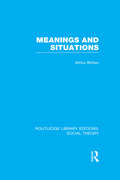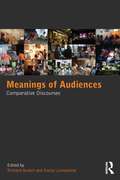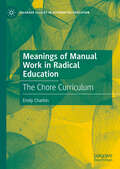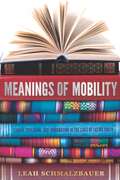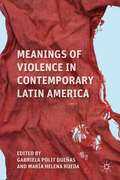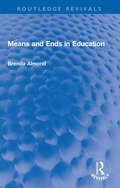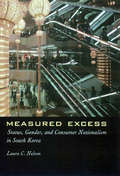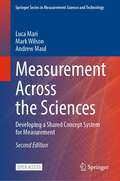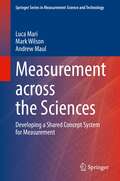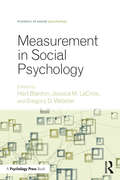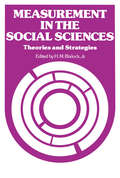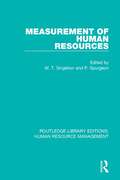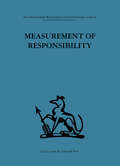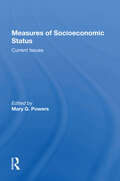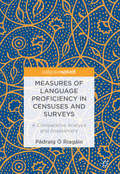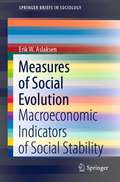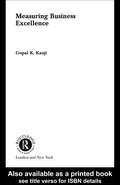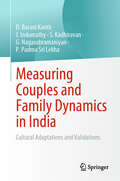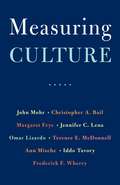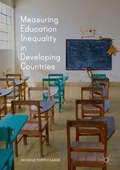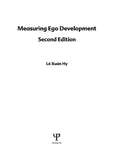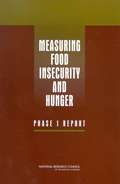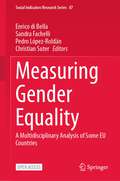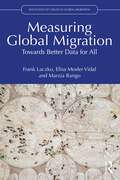- Table View
- List View
Meanings and Situations (Routledge Library Editions: Social Theory Ser.)
by Arthur BrittanMeanings and Situations is an account of the ‘interactionist’ position. It is a committed account in the sense that it sees the central concerns of social psychology and sociology as being located in an interpretative and humanistic framework. At the same time, it argues for a bio-social image of man which does not do violence to the way in which men in interaction continuously construct and renegotiate ‘meaning’. This is in contrast to some of the highly fashionable ‘exchange’ and ‘game’ models of interaction which dominate the thinking of proponents of ‘respectable’ behavioural science. Hence, so the author urges, the current upsurge of interest in social phenomenology, ethnomethodology and symbolic interactionism is more than a reaction to the reigning paradigm in behavioural science. Arthur Brittan believes this new interest is essentially a return to the humanistic sources of these disciplines which have been in constant danger of being overwhelmed by the ‘behavioural ideology’.
Meanings of Audiences: Comparative Discourses
by Sonia Livingstone Richard ButschIn today’s thoroughly mediated societies people spend many hours in the role of audiences, while powerful organizations, including governments, corporations and schools, reach people via the media. Consequently, how people think about, and organizations treat, audiences has considerable significance. This ground-breaking collection offers original, empirical studies of discourses about audiences by bringing together a genuinely international range of work. With essays on audiences in ancient Greece, early modern Germany, Soviet and post-Soviet Russia, Zimbabwe, contemporary Egypt, Bengali India, China, Taiwan, and immigrant diaspora in Belgium, each chapter examines the ways in which audiences are embedded in discourses of power, representation, and regulation in different yet overlapping ways according to specific socio-historical contexts. Suitable for both undergraduate and postgraduate students, this book is a valuable and original contribution to media and communication studies. It will be particularly useful to those studying audiences and international media.
Meanings of Manual Work in Radical Education: The Chore Curriculum (Palgrave Studies in Alternative Education)
by Emily CharkinThis book aims to challenge and inspire readers with lived examples of alternatives to current paradigms in education, childhood and community, through new research into two important and neglected schools in the history of progressive and radical education. Kilguhanity and Wennington schools were both founded in the UK in 1940, and at both schools pupils and staff were extensively involved in the manual work of looking after and shaping the physical fabric of the community. The author uses these case studies to challenge the tendency to equate pupil participation with ‘voice’ and ‘meetings’, and casts light on a fault line within the progressive and radical traditions. She then presents new challenges and perspectives to ongoing debates about education and childhood, unsettling the stalemate between liberal and traditional, and progressive and radical schools by uncovering a community-based alternative. The book offers a contribution to a growing body of contemporary research literature on progressive and radical education, alternative education, informal education and social pedagogy as well as across the disciplines of childhood studies, history, philosophy and geography.
Meanings of Mobility: Family, Education, and Immigration in the Lives of Latino Youth
by Leah SchmalzbauerOver the past twenty years, elite colleges and universities have enacted policies that have reshaped the racial and class composition of their campuses, and over the past decade, Latinos’ college attendance has notably increased. While discussions on educational mobility focus on its perceived benefits – that it will ultimately lead to social and economic mobility – less attention is paid to the process of “making it” and the challenges low-income youth experience when navigating these elite spaces. In Meanings of Mobility, sociologist Leah C. Schmalzbauer explores the experiences of low-income Latino youth attending highly selective, elite colleges. To better understand these experiences, Schmalzbauer draws on interviews with 60 low-income Latino youth who graduated or were set to graduate from Amherst College, one of the most selective private colleges in the United States. The vast majority of these students were the first in their immigrant families to go to college in the U.S. She finds that while most of the students believed attending Amherst provided them with previously unimaginable opportunities, adjusting to life on campus came with significant challenges, both to the new physical and social environments. Many of the students Schmalzbauer spoke with had difficulties adapting to the new cultural norms at Amherst as well as relating to their non-Latino, non-low-income peers. The challenges these students faced were not limited to life on campus. As they attempted to adapt to Amherst, they felt gaps form between themselves and the family and friends they left behind who could not understand the new hardships they were facing. The students credited their elite education for access to extraordinary educational and employment opportunities. However, their experiences while at Amherst and afterward revealed that the relationship between educational and social mobility is much more complicated and less secure than popular conversations about the “American Dream” suggest. They found that their educational attainment was not enough to erase the core challenges of growing up in a marginalized immigrant family: many were still poor, faced racism, and those who were undocumented or had undocumented family members still feared deportation. Schmalzbeauer provides several suggestions to elite institutions to better support low-income Latino students and lower the emotional price of educational mobility. These suggestions include creating immigration offices on campus that develop programming and supports for undocumented students and undocumented family members. She also recommends educating staff to better understand the centrality of family for these students and the challenges they face, so staff will be able to provide appropriate support and advice. Additionally, she suggests incentivizing more privileged students to take courses to better understand inequality and the experiences of their marginalized peers. Meanings of Mobility provides compelling insights into the lesser-studied difficulties faced by low-income Latinos pursuing educational and social mobility.
Meanings of Violence in Contemporary Latin America
by Gabriela Polit Dueñas María Helena RuedaThis volume includes contributions of scholars from various fields - the social sciences, journalism, the humanities and the arts - whose work offers insightful and innovative ways to understand the devastating and unprecedented forms of violence currently experienced in Latin America. As an interdisciplinary endeavor, it offers an array of perspectives that contribute to ongoing debates in the study of violence in the region.
Means and Ends in Education (Routledge Revivals)
by Brenda AlmondFirst published in 1982, Means and Ends in Education explores the contrasts between approaches to teaching where teaching is simply a means to some other end; approaches in which the end determines the means; and approaches in which means and ends are integrated and education serves an intrinsic purpose. The book considers the concept of education and evaluates different processes and techniques of teaching and learning. Divided into three parts, it covers instrumentalist approaches, learner-oriented approaches, and liberal approaches to education. It puts forward differing views as to what the term ‘education’ means to different professions and in different contexts, and how different approaches result in a very different experience for the recipient. It also discusses the extent to which an evaluation of methods of education and an evaluation of the aims of education are linked. Means and Ends in Education will appeal to those with an interest in the philosophy of education.
Measured Excess: Status, Gender, and Consumer Nationalism in South Korea
by Laura NelsonThis insightful analysis of the ways in which South Korean economic development strategies have reshaped the country's national identity gives specific attention to the manner in which women, as the primary agents of consumption, have been affected by this transformation. Past scholarship on the culture of nationalism has largely focused on the ways in which institutions utilize memory and "history" to construct national identity. In a provocative departure, Laura C. Nelson challenges these assumptions with regard to South Korea, arguing that its identity has been as much tied to notions of the future as rooted in a recollection of the past. Following a backlash against consumerism in the late 1980s, the government spearheaded a program of frugality that eschewed imported goods and foreign travel in order to strengthen South Korea's national identity. Consumption—with its focus on immediate gratification—threatened the state's future-oriented discourse of national unity. In response to this perceived danger, Nelson asserts, the government cast women as the group whose "excessive desires" for material goods were endangering the nation.
Measurement Across the Sciences: Developing a Shared Concept System for Measurement (Springer Series in Measurement Science and Technology)
by Mark Wilson Luca Mari Andrew MaulThis open access book proposes a conceptual framework for understanding measurement across a broad range of scientific fields and areas of application, such as physics, engineering, education, and psychology. It addresses contemporary issues and controversies within measurement in light of the framework, including operationalism, definitional uncertainty, and the relations between measurement and computation, and describes how the framework, operating as a shared concept system, supports understanding measurement’s work in different domains, using examples in the physical and human sciences.This revised and expanded second edition features a new analysis of the analogies and the differences between the error/uncertainty-related approach adopted in physical measurement and the validity-related approach adopted in psychosocial measurement. In addition, it provides a better analysis and presentation of measurement scales, in particular about their relations with quantity units, and introduces the measurand identification/definition as a part of the "Hexagon Framework" along with new examples from the physical and psychosocial sciences. Researchers and academics across a wide range of disciplines including biological, physical, social, and behavioral scientists, as well as specialists in measurement and philosophy appreciate the work’s fresh and provocative approach to the field at a time when sound measurements of complex scientific systems are increasingly essential to solving critical global problems.
Measurement across the Sciences: Developing a Shared Concept System for Measurement (Springer Series in Measurement Science and Technology)
by Mark Wilson Luca Mari Andrew MaulThis book proposes a conceptual framework for understanding measurement across a broad range of scientific fields and areas of application, such as physics, engineering, education, and psychology. The authors, who themselves span these disciplines, argue that the justification of the public trust attributed to measurement results can in principle apply identically to both physical and psychosocial properties. They further argue that the lack of a common conceptualization of measurement hampers interdisciplinary communication and limits the ability to share knowledge. They advance their views by first surveying the conceptual history of the philosophy of measurement and arguing that classical, operationalist and representational perspectives on measurement each make important contributions but also each have important shortcomings. A synthesis is then offered as the foundation for a new conceptual framework. The authors describe how the framework, which operates as a shared concept system, supports understanding measurement’s work in different domains, using examples in the physical and human sciences. They consider connections and consequences with respect to causality, objectivity, and intersubjectivity, among other topics, and how measurement science concepts and issues are construed across these disciplines and settings. They also address contemporary issues and controversies within measurement in the light of the framework, including operationalism, definitional uncertainty, and the relations between measurement and computation. The book concludes with a justification for the basic claim that measurement is an empirical and informational process that produces explicitly justifiable information. Researchers and academics across a wide range of disciplines including biological, physical, social and behavioral scientists, as well as specialists in measurement and philosophy will appreciate the work’s fresh and provocative approach to the field at a time when sound measurements of complex scientific systems are increasingly essential to solving critical global problems.
Measurement in Social Psychology (Frontiers of Social Psychology)
by Hart Blanton LaCroix Jessica M. Webster Gregory D.Although best known for experimental methods, social psychology also has a strong tradition of measurement. This volume seeks to highlight this tradition by introducing readers to measurement strategies that help drive social psychological research and theory development. The books opens with an analysis of the measurement technique that dominates most of the social sciences, self-report. Chapter 1 presents a conceptual framework for interpreting the data generated from self-report, which it uses to provide practical advice on writing strong and structured self-report items. From there, attention is drawn to the many other innovative measurement and data-collection techniques that have helped expand the range of theories social psychologists test. Chapters 2 through 6 introduce techniques designed to measure the internal psychological states of individual respondents, with strategies that can stand alone or complement anything obtained via self-report. Included are chapters on implicit, elicitation, and diary approaches to collecting response data from participants, as well as neurological and psychobiological approaches to inferring underlying mechanisms. The remaining chapters introduce creative data-collection techniques, focusing particular attention on the rich forms of data humans often leave behind. Included are chapters on textual analysis, archival analysis, geocoding, and social media harvesting. The many methods covered in this book complement one another, such that the full volume provides researchers with a powerful toolset to help them better explore what is "social" about human behavior.
Measurement in the Social Sciences
by Hubert M. BlalockAmong the frustrations constantly confronting the social scientist are those associated with the general process of measurement. The importance of good measurement has long been recognized in principle, but it has often been neglected in practice in many of the social sciences. Now that the methodological tools of multivariate analysis, simultaneous-equation estimation, and causal modeling are diffused more widely into the social sciences, and now that the very serious implications of random and non-random measurement errors are being systematically investigated, it is all the more important that social scientists give top priority to the quality of their data and the clarity of their theoretical conceptualizations. The book is organized so that, one proceeds from problems of data collection to those of data analysis. It is not intended to be a complete work covering all types of measurement problems that have arisen in the social sciences. Instead, it represents a series of studies that are deemed to be crucial for the advancement of social science research but which have not received sufficient attention in most of the social sciences. The basic purpose is to stimulate further methodological research on measurement and to study the ways in which knowledge that has been accumulated in some fields may be generalized. Part I is concerned with applying scaling approaches developed in psychometrics to problems that arise in other social sciences. The focus is on finding better ways to ask questions of respondents so as to raise the level of measurement above that of simple ordinal scales. Part II focuses on multiple-indicator theory and strategies as applied to relatively complex models and to change data. In this section the emphasis shifts to how one analyzes fallible data through the construction of explicit measurement-error models. Part III deals with the statistical analysis of ordinal data, including the interpretation and empirical behaviors of various ordinal measures of association.
Measurement of Human Resources (Routledge Library Editions: Human Resource Management #34)
by W T Singleton P SpurgeonThe issue of physical resources is one of considerable interest in the field of human resource management, but the solution to such difficulties must depend upon the skills and enterprise of those in positions of management. The purpose of this book, first published in 1975, is to focus upon these skills and upon the issues involved in examining the utilisation of human resources. The concept of human resources is an extremely broad one and there are many relevant disciplines. Each discipline provides information with respect to monitoring, developing or utilising the human resource. The set of papers in this volume will provide a source of reference for a wide range of research worker, practitioners and students in the total sphere of human resources as well as within the various disciplines represented.
Measurement of Responsibility: A study of work, payment, and individual capacity (International Behavioural And Social Sciences Ser. #Vol. 51)
by Elliott JaquesTavistock Press was established as a co-operative venture between the Tavistock Institute and Routledge & Kegan Paul (RKP) in the 1950s to produce a series of major contributions across the social sciences. This volume is part of a 2001 reissue of a selection of those important works which have since gone out of print, or are difficult to locate. Published by Routledge, 112 volumes in total are being brought together under the name The International Behavioural and Social Sciences Library: Classics from the Tavistock Press. Reproduced here in facsimile, this volume was originally published in 1956 and is available individually. The collection is also available in a number of themed mini-sets of between 5 and 13 volumes, or as a complete collection.
Measures Of Socioeconomic Status: Current Issues
by Mary G PowersThis text consists of a collection of seven papers which look at constructing measures of occupational socioeconomic status by combining census data on occupation-specific levels of education and income; including different approaches.
Measures of Language Proficiency in Censuses and Surveys: A Comparative Analysis and Assessment
by Pádraig Ó RiagáinThis book offers a systematic analysis of a wide range of questions used in censuses, national surveys and international surveys to measure language proficiency. It addresses the urgent need in language related survey research for a comprehensive examination of the large existing body of survey data in order to provide a fuller understanding of the extent to which survey results are shaped by the way language proficiency questions are worded. While census and survey language proficiency data are extensively used in a wide range of research areas, as well as in forming, implementing and monitoring government policies, there are as yet no universally accepted survey measures of language proficiency. This book will therefore provide a valuable resource for students and scholars working in sociological areas that use census or survey language data, such as sociology of language, sociology of education, politics, racial and ethnic studies, and cultural studies; as well as for policy analysts.
Measures of Social Evolution: Macroeconomic Indicators of Social Stability (SpringerBriefs in Sociology)
by Erik W. AslaksenThis book extends a previously published model of social evolution by using macroeconomic measures to indicate both the current state of the society, and its evolutionary trajectory. This model considers society as a system of interacting elements evolving through stages of increasing strength of interaction and complexity of structure. It measures society in constituting the world collectively, with nation-states as the elements, here described through macroeconomic measures such as GDP, government expenditure, and inequality. The economic data presented indicates that this stage is approaching the next evolutionary step, which is either the formation of a world society of nations, with an associated overarching common infrastructure absorbing some of the sovereign functions of nation-states as they exist today, or as a society of competing groups of nations, each bound by alliances and bilateral agreements. The book explores how the former faces great obstacles in the form of nationalism and a misunderstood concept of sovereignty, and poses that it is in an embryonic stage. The author poses that it is this structure that would be best equipped to handle common challenges, such as the environment and global warming, and topically, pandemics. A novel interdisciplinary text in social complexity, this book is of interest to researchers in socio-economic fields.
Measuring Advertising Effectiveness
by William D. WellsThis volume includes edited and revised versions of the papers delivered and discussed at the recent Advertising and Consumer Psychology Conference. Following the theme of the conference -- "Measuring Advertising Effectiveness" -- the book blends academic psychology, marketing theory, survey methodology, and practical experience, while simultaneously addressing the problems and limitations of advertising. Acknowledging that advertisements are subtle, diverse, complex phenomena that require detailed investigation, this compilation explores the multidimensional nature of advertising's diverse effects from both academic and applied perspectives. Updates on theories and methods -- along with expert commentaries -- help to make this a valuable collection that will be of interest to advertising and marketing specialists and communications experts alike.
Measuring Business Excellence (Routledge Advances in Management and Business Studies #Vol. 21)
by Gopal K. KanjiBusiness Excellence and Total Quality Management (TQM) models provide a means of measuring the satisfaction of customers, employees and shareholders simultaneously. A number of such models currently exist, but, the author argues, none of these address all dimensions of TQM.This book introduces the principles of TQM, and establishes their use in measuring Business Excellence in an organisational environment. It comparatively evaluates various TQM and Business Excellence models, and discusses the complexities of measuring success.Presenting important, innovative work by one of the most eminent scholars in the field, this book is essential reading for both academics and professionals working in quality management.
Measuring Couples and Family Dynamics in India: Cultural Adaptations and Validations
by D. Barani Kanth J. Indumathy S. Kadhiravan G. Nagasubramaniyan P. Padma Sri LekhaThis book provides a cross-cultural validation for 18 important questionnaires widely used in family research in India. It addresses the issue of cross-cultural validity by presenting analytical procedures and evidences for the validity of these scales in the Indian cultural context. Additionally, it offers valuable methods and procedures involved in the translation, adaptation and cross-cultural validation of scales in family research. The book also discusses essential nuances in data analysis, including Confirmatory Factor Analysis (CFA), Measurement Invariance (MI), and constructs validity while developing and validating scales used in social science research. It is an ideal companion for any researcher or practitioner looking for scales validated in the Indian cultural context in family psychology. It is also suitable for students interested in learning the practical aspects of psychometric methods and the validation of scales.
Measuring Culture
by Frederick F. Wherry Jennifer C. Lena Ann Mische Iddo Tavory Christopher A. Bail Omar Lizardo John W. Mohr Margaret Frye Terence E. McDonnellSocial scientists seek to develop systematic ways to understand how people make meaning and how the meanings they make shape them and the world in which they live. But how do we measure such processes? Measuring Culture is an essential point of entry for both those new to the field and those who are deeply immersed in the measurement of meaning. Written collectively by a team of leading qualitative and quantitative sociologists of culture, the book considers three common subjects of measurement—people, objects, and relationships—and then discusses how to pivot effectively between subjects and methods. Measuring Culture takes the reader on a tour of the state of the art in measuring meaning, from discussions of neuroscience to computational social science. It provides both the definitive introduction to the sociological literature on culture as well as a critical set of case studies for methods courses across the social sciences.
Measuring Education Inequality in Developing Countries
by Nichole Torpey-SaboeThis book constructs a measure of education inequality using time-series cross-national data and utilizes real-world examples based on author interviews. It provides insights into how classic trade theory might be applied more broadly to generate expectations not only about income distribution, but also about investment in human capital. The project explores the ways in which global trends toward urbanization and democratization might be expected to impact education inequality. The author addresses contemporary issues in politics, such as growing income inequality, the backlash against globalization and free trade, and concerns that democratic institutions are elite-dominated and unresponsive to the needs of common citizens.
Measuring Ego Development: The Washington University Sentence Completion Test
by Le Xuan Hy Jane LoevingerThe topic of ego development developed when psychoanalysis did not fulfill all the initial hopes during its early period of prominence. Clinicians--psychiatrists, psychologists, social workers, and counselors--realized that they needed to know more than their patients' or clients' psychopathology or normalcy and their psychosexual behavior and drives. The method for scoring sentence completions presented in this manual was originally developed for a study of women and adolescent girls. By the time it was first published in 1970, however, the method had already come into use in studies of men and boys. Since then, it has been used with widely varying samples, and the test has been translated into several other languages. This wide adoption testifies to the need for such a test. The present version of the manual incorporates three major improvements: * it is based on data from, and is intended for use with, both males and females, * its format is easier to use, and * the examples cited reflect current public attitudes. The format of the scoring manual for the Sentence Completion Test (SCT) is radically changed from the original, making it easier to find the correct rating for a response. The rating scale itself is kept simple and the basic concept of ego development is the same. A tutorial is included to assist in calculating the Total Protocol Ratings (TPRs). ALTERNATIVE BLURB!!! The Washington University Sentence Completion Test, which was developed by Jane Loevinger, is a free-response, semi-projective instrument for the assessment of ego development. The first manual for administering and scoring the test was published in 1970. In addition to its widespread use in the United States, it has also been adopted for use in Canada, the United Kingdom, France, Germany, Italy, the Netherlands, Japan, India, and South Africa. The WUSCT has been used for research in the fields of adolescent personality development, moral development, infancy and parenting, family and gender studies, multiculturalism, religion, psychopathology and psychotherapy, vocational studies, and social and organizational psychology. It is most frequently used by researchers and practitioners in psychology, counseling, social work, and education. This book represents a revised edition of the WUSCT scoring manual, including all items in the 1981 forms, which were revised for use with both men and women. The content reflects current social attitudes, which have changed on some topics since the publication of the original 1970 manual. Although there have been minor changes in terminology, the conception of ego development is unchanged, and the stages of the construct are essentially the same. The format of the scoring manual, however, has been radically changed for ease of use in rating responses. (The rating scale itself, which is the same for all items, is kept simple.) A tutorial is included to assist in calculating the Total Protocol Ratings.
Measuring Food Insecurity And Hunger: Phase 1 Report
by National Research Council of the National AcademiesThe National Academies Press (NAP)--publisher for the National Academies--publishes more than 200 books a year offering the most authoritative views, definitive information, and groundbreaking recommendations on a wide range of topics in science, engineering, and health. Our books are unique in that they are authored by the nation's leading experts in every scientific field.
Measuring Gender Equality: A Multidisciplinary Analysis of Some EU Countries (Social Indicators Research Series #87)
by Christian Suter Pedro López-Roldán Sandra Fachelli Enrico Di BellaIn this open access book, the editors explicitly address the issue of measuring gender equality. The book introduces readers to basic concepts of gender equality, equity and equal opportunities, then discusses measuring these phenomena, the methods of constructing indicators, and reviews the main indicators that have been proposed at the international level to measure gender equality. It then sets the theoretical discussions against the findings from a Jean Monnet project financed by the European Union to highlight the importance of a regional analysis of gender equality in four main study areas: Italy, Spain, France and Germany. The results make it clear that it is necessary to move from the purely national perspective hitherto used in gender equality analyses to a regional one because differences can be highly pronounced even within the same country. This is a self-contained volume requiring limited statistical expertise for the reader and is aimed at social researchers and policymakers who wish to address gender equality from a quantitative perspective.
Measuring Global Migration: Towards Better Data for All (Routledge Key Issues in Global Migration)
by Frank Laczko Elisa Mosler Vidal Marzia RangoThis book focuses on how to improve the collection, analysis and responsible use of data on global migration and international mobility.While migration remains a topic of great policy interest for governments around the world, there is a serious lack of reliable, timely, disaggregated and comparable data on it, and often insufficient safeguards to protect migrants’ information. Meanwhile, vast amounts of data about the movement of people are being generated in real time due to new technologies, but these have not yet been fully captured and utilized by migration policymakers, who often do not have enough data to inform their policies and programmes. The lack of migration data has been internationally recognized; the Global Compact for Safe, Orderly and Regular Migration urges all countries to improve data on migration to ensure that policies and programmes are "evidence-based", but does not spell out how this could be done. This book examines both the technical data issues associated with improving data on migration and the wider political challenges of how countries manage the collection and use of migration data. The first part of the book discusses how much we really know about international migration based on existing data, and key concepts and approaches which are often used to measure migration. The second part of the book examines what measures could be taken to improve migration data, highlighting examples of good practice from around the world in recent years, across a range of different policy areas, such as health, climate change and sustainable development more broadly. Written by leading experts on international migration data, this book is the perfect guide for students, policymakers and practitioners looking to understand more about the existing evidence base on migration and what can be done to improve it.
